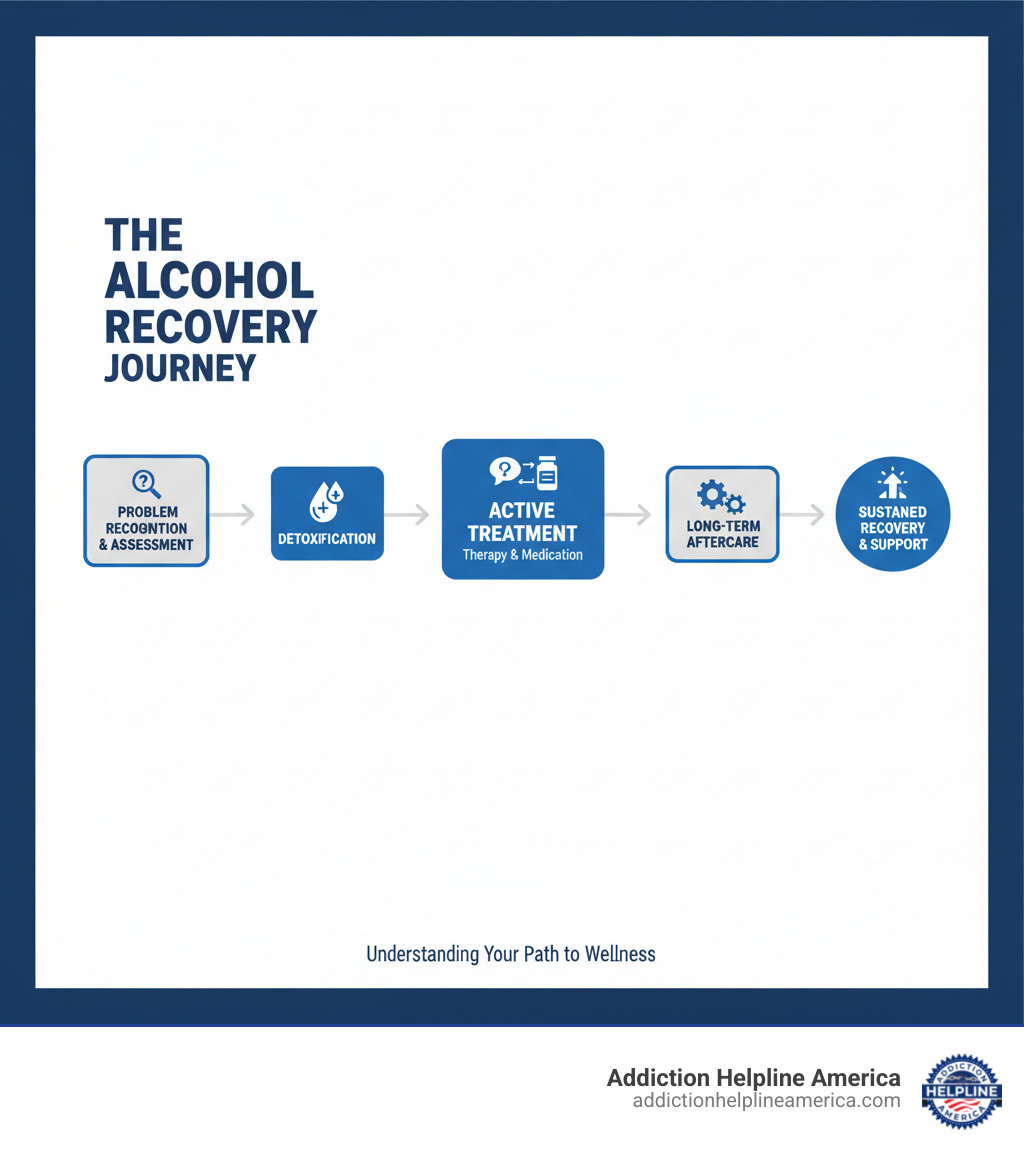
Understanding Your Path to Recovery
Alcohol rehab treatment options are diverse, evidence-based pathways designed to help individuals overcome alcohol use disorder (AUD) and reclaim their lives. With nearly a quarter of adults meeting the criteria for AUD at some point, it’s a common struggle. The good news? Recovery is possible. Research shows that most people with AUD benefit from treatment, achieving long-term sobriety or substantially reducing their drinking.
The journey is unique for everyone. Some need intensive residential care, while others thrive in outpatient settings. The key is finding the right combination of services, which can include:
- Medical Detoxification
- Inpatient/Residential Treatment
- Partial Hospitalization (PHP) & Intensive Outpatient (IOP) Programs
- Standard Outpatient & Telehealth Services
- Medication-Assisted Treatment (MAT)
This guide walks you through these alcohol rehab treatment options, helping you understand what each offers and how to choose the best path forward. We’ll cover everything from detox to aftercare, payment options, and finding qualified providers.
About Addiction Helpline America: We are a dedicated resource with experienced addiction specialists who help individuals and families steer alcohol rehab treatment options every day, providing free, confidential guidance 24/7 to connect you with the right treatment program for your unique situation. Our team understands that seeking help can feel overwhelming, and we’re here to make the process as clear and supportive as possible.

Recognizing the Need for Alcohol Addiction Treatment
Admitting that alcohol has become a problem is the most important step toward recovery. Alcohol Use Disorder (AUD) is a treatable medical condition, not a character flaw. It’s not about a lack of willpower; it’s a health issue that responds well to professional care. Unfortunately, stigma often prevents people from seeking the help they deserve.
Call Now – Your Journey to Recovery Begins Today!

Take the first step towards a healthier life! Call now to connect with our compassionate team and start your recovery journey today. Your path to healing awaits!
Our recovery specialists are available 24/7 to provide support, and all calls are confidential and free. Reach out anytime – we’re here to help!
When is it time for treatment?
You don’t have to hit “rock bottom” to benefit from treatment. Seeking help early often leads to better outcomes. According to the National Institute on Alcohol Abuse and Alcoholism (NIAAA), experiencing two or more of the following symptoms within a year suggests it’s time for a professional assessment. You can find more information on AUD from the NIAAA to better understand the condition.
Consider seeking help if you or a loved one has:
- Drunk more or for longer than intended.
- Tried to cut back or quit but couldn’t.
- Spent a lot of time drinking or recovering from its effects.
- Experienced strong cravings for alcohol.
- Found that drinking interferes with responsibilities at work, school, or home.
- Continued drinking despite it causing relationship problems.
- Given up important social, occupational, or recreational activities because of alcohol use.
- Used alcohol in physically dangerous situations (like driving).
- Kept drinking despite it worsening a physical or mental health problem.
- Developed a tolerance, needing more alcohol to get the same effect.
- Experienced withdrawal symptoms (like shakiness, anxiety, nausea) when cutting back.
These signs indicate that the brain and body have adapted to alcohol in a way that requires professional support to address safely. A professional assessment can determine the severity of AUD (mild, moderate, or severe) and guide you to the right alcohol rehab treatment options.
Early intervention is key. The sooner you seek help, the more options you’ll have. Reaching out for a confidential assessment is a sign of strength. At Addiction Helpline America, our team can connect you with qualified professionals for a thorough, compassionate assessment with no judgment, just support.
The Core Components of Alcohol Rehabilitation
Effective alcohol rehab programs integrate several core components to address the physical, psychological, and social aspects of addiction. This multi-faceted approach provides a comprehensive foundation for lasting recovery.

Medically-Supervised Detoxification
For those with physical dependence on alcohol, stopping suddenly can cause dangerous withdrawal symptoms. Medically-supervised detoxification is the critical first step, providing a safe environment to manage this process. Medical professionals monitor you 24/7 and may administer medications to ease symptoms like tremors, anxiety, and nausea, and to prevent severe complications like seizures. Detox stabilizes the body, typically over 7 to 10 days, but it must be followed by further treatment to address the root causes of addiction.
Behavioral Therapies and Counseling
Once detox is complete, therapy helps you understand the thoughts and behaviors that drove your drinking. These sessions provide practical tools for a life without alcohol.
- Cognitive-Behavioral Therapy (CBT) is a highly effective method that teaches you to identify, challenge, and change negative thought patterns and behaviors related to alcohol use. You’ll learn skills to manage triggers and cope with stress.
- Motivational Improvement Therapy helps you find your own internal motivation for change, which is especially useful if you’re feeling ambivalent about sobriety.
- Family Therapy involves loved ones in the healing process, helping to repair relationships, improve communication, and build a supportive home environment.
Medication-Assisted Treatment (MAT)
Medication-Assisted Treatment (MAT) combines FDA-approved medications with counseling to treat alcohol use disorder effectively. These non-addictive medications work on brain chemistry to reduce cravings and support sobriety.
- Naltrexone (pill or monthly injection) blocks the euphoric effects of alcohol, reducing the desire to drink.
- Acamprosate helps rebalance brain chemicals disrupted by chronic drinking, easing post-acute withdrawal symptoms like anxiety and restlessness.
- Disulfiram causes an unpleasant physical reaction if alcohol is consumed, acting as a strong deterrent.
Dual Diagnosis for Co-occurring Disorders
It’s common for alcohol use disorder to exist alongside mental health conditions like depression, anxiety, or PTSD. This is called a dual diagnosis. Effective treatment requires an integrated approach that addresses both conditions simultaneously. Treating the mental health issue often reduces alcohol cravings, and achieving sobriety can improve mental health symptoms. Quality rehab programs screen for co-occurring disorders and create a unified treatment plan to address both from the start.
A Guide to Alcohol Rehab Treatment Options
Choosing the right path from the available alcohol rehab treatment options is easier when you understand the different levels of care. The best choice depends on the severity of your alcohol use, your home environment, and your daily commitments.

Inpatient vs. Outpatient Programs
The primary choice is between inpatient (residential) and outpatient care. Inpatient programs provide a 24/7 structured, supervised environment away from daily triggers, which is ideal for severe AUD or those needing medical supervision. Outpatient programs allow you to live at home and maintain work or family responsibilities while attending scheduled therapy, making them suitable for those with mild to moderate AUD and a stable support system.
Here’s a quick comparison:
| Feature | Inpatient/Residential Treatment | Outpatient Treatment |
|---|---|---|
| Structure | Highly structured, 24/7 supervised environment | Flexible, allows individuals to live at home |
| Time Commitment | Full-time, living at the facility (e.g., 30, 60, 90 days) | Part-time, few hours per week, allowing for daily responsibilities |
| Environment | Substance-free, supportive, removed from triggers | Daily exposure to home environment, work, and social life |
| Ideal Candidate | Severe AUD, co-occurring disorders, unstable home environment, need for medical supervision | Mild to moderate AUD, stable home, strong support system, work/school commitments |
| Average Cost | Generally higher due to room, board, and intensive care | Generally lower, focusing on therapy and counseling services |
Levels of Care in Addiction Treatment
Addiction treatment exists on a continuum of care, allowing you to find the right intensity of support for your needs.
- Residential Treatment: The most intensive level, where you live at the facility for 30-90 days (or longer) for immersive therapy and support.
- Partial Hospitalization Programs (PHP): A step down from residential care, offering intensive treatment during the day (5-7 days/week) while you return home at night.
- Intensive Outpatient Programs (IOP): Provides structured therapy for 9-20 hours per week, allowing you to maintain work or school schedules. It’s a common step-down from inpatient care or a starting point for moderate AUD.
- Standard Outpatient Counseling: The most flexible option, involving regular (e.g., weekly) therapy sessions. It’s ideal for mild AUD or as ongoing aftercare.
Modern Alcohol Rehab Treatment Options: Telehealth and Online Care
Telehealth has become a highly effective and convenient treatment option. It offers access to licensed therapists, group counseling, and medication management from home, removing barriers like travel and scheduling conflicts. Virtual programs, including IOPs, use the same evidence-based therapies as in-person care, delivered via secure video conferencing. Most insurance providers now cover telehealth services, making this flexible option widely accessible across our network of states.
Finding the right level of support is crucial. At Addiction Helpline America, our specialists provide free, confidential guidance to connect you with the program that best fits your unique situation.
Call Now – Your Journey to Recovery Begins Today!

Take the first step towards a healthier life! Call now to connect with our compassionate team and start your recovery journey today. Your path to healing awaits!
Our recovery specialists are available 24/7 to provide support, and all calls are confidential and free. Reach out anytime – we’re here to help!
How to Choose the Right Treatment Program
Selecting the right alcohol rehab treatment options is a personal decision. Considering your unique needs will help you find a path that truly supports your recovery.

Key Factors in Your Decision
A professional needs assessment is the first step. Key factors to consider include:
- Severity of Addiction: Determines the necessary level of care (e.g., inpatient vs. outpatient).
- Co-occurring Mental Health Conditions: Essential to find a program offering integrated treatment for conditions like depression or anxiety alongside AUD.
- Program Philosophy: Look for an approach that resonates with you, whether it’s based on evidence-based therapies like CBT, 12-step principles, or holistic methods.
- Location and Environment: Decide if you’d benefit from a new setting away from triggers or if staying close to your home support system is better.
Specialized Programs for Diverse Populations
Many programs offer specialized tracks to provide more relevant and effective care:
- Youth and Young Adults: Address age-specific challenges like peer pressure and academic stress.
- LGBTQ+ Affirming Care: Provides a safe, inclusive space that understands the unique stressors faced by the LGBTQ+ community.
- Veterans: Designed with an understanding of military culture and service-related issues like PTSD.
- Gender-Specific Treatment: Allows men or women to address sensitive topics in a peer-supported environment.
Navigating Costs and Payment Options
The cost of rehab varies, but several options can make it affordable:
- Private Insurance: Most plans cover some portion of addiction treatment. We can help you verify your benefits.
- Self-Pay: Many facilities offer payment plans or financing.
- Sliding Scale Fees: Some centers adjust costs based on your income.
- State-Funded Programs: Government-funded options are available for those with limited financial resources.
Finding a Qualified Treatment Facility
Quality of care is paramount. Look for facilities with proper licensing and accreditation from bodies like The Joint Commission or CARF, which ensures they meet high standards. Ask potential providers about their use of evidence-based therapies, staff credentials, and aftercare planning.
Using trusted resources can simplify your search. The NIAAA Alcohol Treatment Navigator® is an excellent government tool for finding quality care. Of course, our team at Addiction Helpline America is here to provide free, confidential guidance to help you steer these alcohol rehab treatment options and find the right fit for you.
Life After Rehab: Aftercare and Sustaining Recovery
Completing a rehab program is a major achievement, but recovery is a lifelong journey. Aftercare refers to the ongoing support you receive after initial treatment, and it is essential for long-term success. A quality program will help you create a comprehensive aftercare plan before you leave.
This plan is your roadmap for navigating daily life while staying sober. It includes relapse prevention strategies, such as identifying personal triggers and developing healthy coping mechanisms like mindfulness, exercise, or journaling. Key components of a strong aftercare plan often include:
Sober Living Homes: For those needing a structured, substance-free environment after residential treatment, these homes offer a bridge to independent living. They provide accountability and a supportive community as you rebuild your life.
Ongoing Therapy: Continuing with individual or group therapy provides consistent support for navigating real-world challenges. It’s a space to process emotions, work through setbacks, and reinforce healthy thought pattern
Peer Support Groups: Connecting with others who understand your journey is incredibly powerful. Peer support groups offer a sense of community, encouragement, and shared experience that reduces feelings of isolation.
Building a Recovery Community: Surrounding yourself with sober friends, supportive family, and mentors creates a strong safety net. This community celebrates your successes and provides support during difficult moments.
Recovery evolves after treatment ends. With a solid aftercare plan, you can build a fulfilling, sober life. When exploring alcohol rehab treatment options, ensure the program includes robust aftercare planning.
Frequently Asked Questions about Alcohol Rehab
Deciding to seek help brings up many questions. Here are concise answers to some of the most common ones about alcohol rehab treatment options.
What should I expect during the alcohol rehab process?
The process generally follows four main steps:
- Intake and Assessment: A professional will evaluate your drinking history, health, and personal circumstances to create a custom treatment plan.
- Detoxification: For those with physical dependence, this is a medically supervised period to safely manage withdrawal symptoms.
- Therapy and Counseling: This is the core of treatment, involving individual, group, and sometimes family therapy to address the root causes of addiction and build coping skills.
- Aftercare Planning: Before you finish the program, your team will help you create a plan for ongoing support to sustain your recovery.
How long does alcohol rehab last?
Treatment duration is individualized to fit your specific needs. There is no one-size-fits-all timeline. However, there are common program lengths:
- Detox: Typically 7-10 days.
- Inpatient/Residential: Often 30, 60, or 90 days. Research shows longer stays often lead to better long-term outcomes.
- Outpatient (IOP/PHP): Can range from one to several months.
Recovery often follows a continuum of care, where you might step down from a more intensive program to less intensive outpatient care and ongoing support groups. Sustained recovery is a process, not a single event.
Is alcohol rehab confidential?
Yes, absolutely. Patient privacy is legally protected by strict federal laws like HIPAA (the Health Insurance Portability and Accountability Act). A treatment provider cannot share any of your medical information—including your participation in rehab—with your employer, family, or anyone else without your explicit written consent.
This confidentiality is crucial, as it creates a safe space for you to be honest and focus completely on your healing. When you call Addiction Helpline America, your conversation is also 100% confidential, allowing you to explore your options without fear.
Call Now – Your Journey to Recovery Begins Today!

Take the first step towards a healthier life! Call now to connect with our compassionate team and start your recovery journey today. Your path to healing awaits!
Our recovery specialists are available 24/7 to provide support, and all calls are confidential and free. Reach out anytime – we’re here to help!
Start Your Recovery Journey Today
Recovery from alcohol use disorder is absolutely achievable. The landscape of alcohol rehab treatment options is more diverse and accessible than ever, with a path that’s right for your unique situation, whether it’s residential care, outpatient therapy, or virtual counseling.
Navigating these options can feel overwhelming, but you don’t have to do it alone. At Addiction Helpline America, we make the complicated simple. Our experienced specialists provide free, confidential, and personalized guidance 24/7. We listen to your needs and help you connect with the right treatment program from our nationwide network of quality facilities.
Don’t wait or feel ashamed to reach out for help. Recovery starts with a single, confidential conversation. Your future is worth it.
Reach out today and let us help you find the path that leads you home.
Find the right drug rehab program for you
Our helpline is 100%
free & confidential
If you or someone you care about is struggling with drug or alcohol addiction, we can help you explore your recovery options. Don’t face this challenge alone—seek support from us.
Addiction Helpline America: Free Confidential Alcohol Rehab Support
Resources
Will my insurance
cover addiction
treatment?
We're ready to help
Find the best
drug or alcohol treatment
center
Are you or a loved one struggling with addiction? Call today to speak to a treatment expert.















